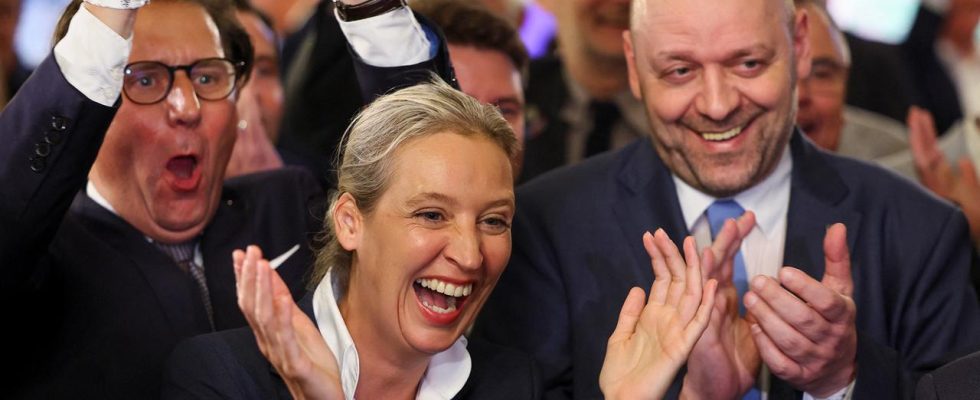The AfD achieved its best result in West Germany to date in Hesse. In Bavaria, too, the party is now on a par with the Greens and Free Voters. The traffic light coalition provided the reasons for the upswing – and not just from the AfD’s perspective.
For the AfD, the double election in Bavaria and Hesse will be a double success: in Bavaria, according to projections, the party will gain more than five percentage points. And in Hesse, the AfD can most likely achieve its best result to date in a western German state – and, according to projections, will become the second strongest force behind the CDU.
It’s no wonder that the top candidates in both federal states, but also the party leadership at the federal level, are in a celebratory mood. She is “extremely proud,” says party leader Alice Weidel. In both federal states, the forecast result is so good that it beats “everything from the past”.
In both Bavaria and Hesse, the AfD was able to attract voters from other parties into its own camp. In Bavaria, the CSU in particular lost votes to the AfD, as data from Infratest dimap shows. This time around 90,000 citizens voted for the AfD instead of Prime Minister Markus Söder’s CSU.
The CSU’s previous and probably future junior partner, the Free Voters, also clearly felt the AfD’s strengthening by losing around 50,000 votes. Around 40,000 votes from the FDP switched to the AfD, and around 20,000 from the SPD and Greens. But according to Infratest dimap, the AfD was also able to persuade many previous non-voters to go to the polls and win around 70,000 votes from this camp.
In Hesse, the SPD and FDP in particular are losing votes to the AfD
While in Bavaria it is primarily the CSU that is losing to the AfD, a slightly different picture emerges in Hesse. Here only 2,000 voters switched from the election winner, the CDU, to the AfD. However, the SPD and FDP recorded significantly higher losses, with 20,000 and 18,000 votes lost to the AfD. According to projections, the AfD was able to withdraw around 10,000 voters from the Left Party, which will probably no longer sit in the state parliament in Wiesbaden in the future.
The number of former non-voters who have now voted for the AfD is also significantly lower in Hesse than in Bavaria. Nevertheless, the party recorded gains of around 13,000 votes here.
Party benefits from “ban policy” of the traffic light coalition
AfD leader Weidel sees the reasons for the strong performance as less anchored in the two electoral federal states, but rather in Berlin. Your party benefited from a “special effect”, namely the fact that people in Germany are dissatisfied with the federal government’s “prohibition policy”. The traffic light coalition is doing “politics against its own population” and the voters have “clearly rejected it.” They have voted “for political change throughout Germany.”
The other parties also blame Berlin for the AfD’s vote gains. In Bavaria, the SPD and the Greens emphasize that there was hardly any talk about state political issues during the election campaign, such as education or the path to the energy transition. Instead, federal politics took center stage, especially the debate about migration policy.
After all, according to infratest dimap, the issue of immigration in Hesse was the decisive issue for 18 percent of the population in their own voting decision – behind economic development and climate policy.
In Bavaria, immigration was even the second most important factor in the election, behind the economy. In the run-up to the election, 48 percent of all respondents told Infratest dimap that they welcomed the fact that the AfD wanted to limit the influx of foreigners and refugees more strongly. In Hesse, too, the AfD’s negative line on migration policy was approved by 42 percent of those surveyed.
Stricter asylum policies in both countries are an election campaign issue
During the election campaign, the two Bavarian top candidates Katrin Ebner-Steiner and Martin Böhm also campaigned for a significantly stricter course in migration policy. Rejected asylum seekers were to be expelled from Germany within six months, and Böhm brought up separate primary school classes between native speakers and “children with language problems”. However, neither proposal made it into the party’s official election program.
Hesse’s top candidate for the AfD, Robert Lambrou, also drummed up support in the election campaign for faster deportations and immigration of skilled workers only in exceptional cases, and if so, then from “neighboring countries that are culturally close to Germany.” He completely denies his party’s right-wing extremist tendencies as a “bourgeois-conservative force” – including in the debate surrounding the spokesman for the Hessian AfD faction, Andreas Lichert, who is said to have connections to the “Identitarian Movement”. Lichert stated that he did not classify the group as extremist and denied any cooperation.
No chance Government role
Also with a view to the opposition role in the Hesse state parliament, Lambrou assured that the AfD wanted to appear “with a very strong voice” – “bourgeois, conservative, liberal”. During the election campaign, the AfD openly advertised itself as a coalition partner for the CDU, but this fell on deaf ears.
In Bavaria, too, all parties vehemently rule out cooperation with the AfD. Instead, calls are being made for closer cooperation at the federal level to regain voters’ lost trust in the democratic parties, as Green Party leader Omid Nouripour put it.
SPD General Secretary Kevin Kühnert also sees the outcome of the double election as a “message to Berlin”. “The general mood weighs on people’s minds,” he emphasized. “More orientation” needs to be created and solutions need to be found through more cooperation.

